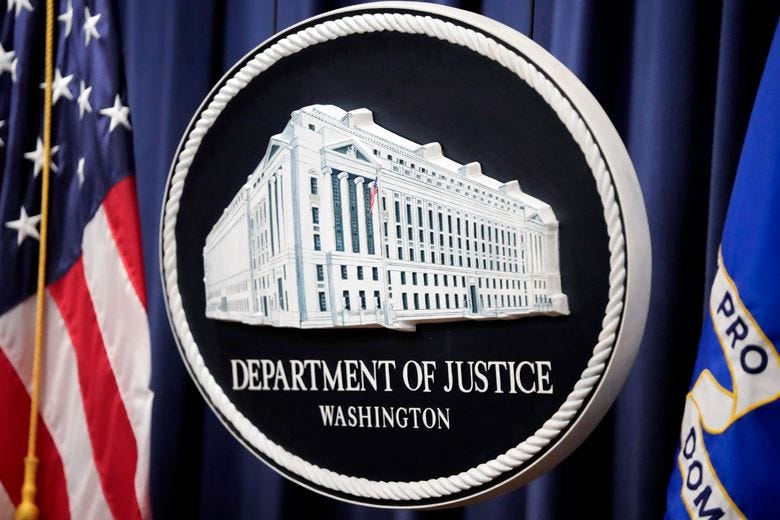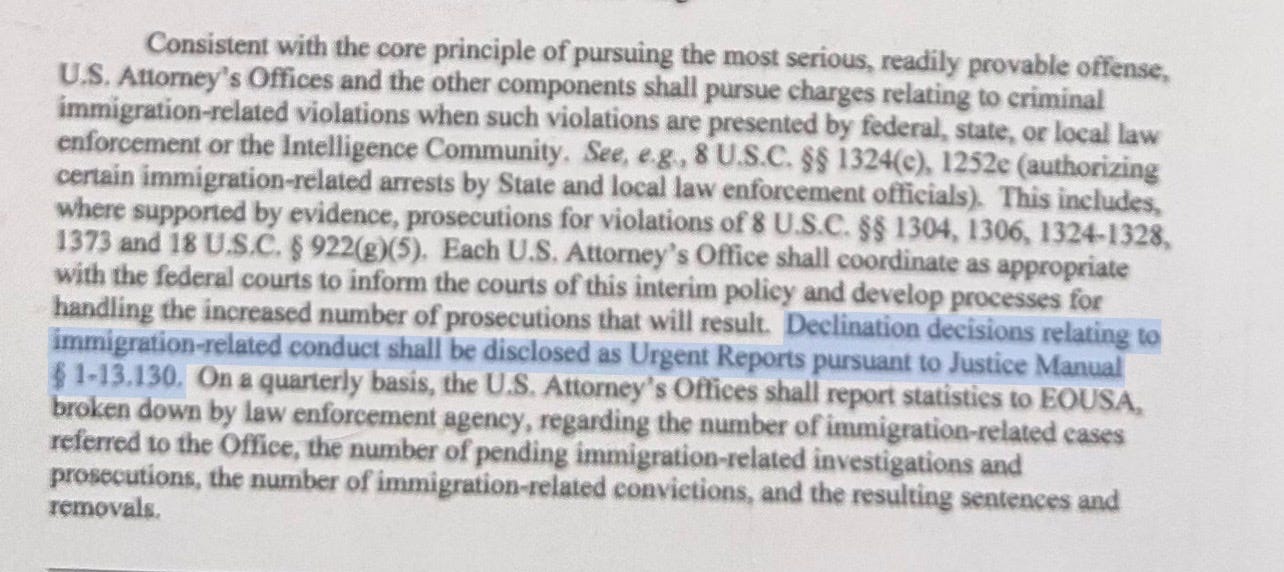Center Stage: Immigration
The day started off with the Justice Department’s new management directing prosecutors to investigate, and even prosecute, what they perceive as state or local efforts to obstruct immigration enforcement.
It’s an injection of poison into the bloodstream of democracy. Trump is threatening to prosecute those who don’t go along with his plans—legal or not, consistent with state policy or not, part of their job or not. The message is, bend your will to the leader or else. That’s autocracy.

The DOJ memo claims that the Supremacy Clause of the Constitution requires state and local officials to comply. But that’s wrong—state officials can’t be compelled to enforce federal law. Just ask Supreme Court Justice Antonin Scalia, who wrote the majority opinion in Printz v. U.S. The issue in that case was whether state and local law enforcement officers could be required to enforce interim provisions of the Brady Handgun Violence Prevention Act, for instance, by conducting background checks on prospective handgun purchasers. Justice Scalia held that the federal government could not require states to enforce or enact federal regulatory programs. Doing so would violate the states’ sovereignty.
In other words, what’s happening here is unconstitutional according to a widely venerated conservative Justice. Presumably, even an acting official at the Justice Department is capable of reading the law and knowing that what they’re ordering Justice Department employees across the country to do is contrary to well-established law.
The memo is signed by acting deputy attorney general and former Trump lawyer Emil Bove. That makes it difficult to avoid questions about whether this memo is the product of DOJ taking explicit direction on criminal cases from the White House, if not from the President himself. Even though the courts would be unlikely to let DOJ prosecute on this unconstitutional theory, that won’t stop this Justice Department from trying to coerce state and local officials into going along because it’s easier. Federal officials who are willing to can (ab)use their power to make life extremely unpleasant for officials who refuse to bend the knee. That makes the entire situation all the more disturbing.
Immigration-related offenses have been among DOJ’s most prosecuted cases for more than a quarter of a century. They were the most common cases brought in fiscal year 2023, when 30% of DOJ’s cases involved immigration offenses. U.S. Sentencing Commission data reflects that 19,226 defendants were sentenced for immigration offenses in 2023, which was an increase of 8.9% increase over 2022—in other words, the number of cases was growing during the Biden administration.
Now, Trump’s DOJ is demanding that federal prosecutors devote even more resources to the cases, which means other cases will go undone. But they are further elevating these cases, requiring frequent reporting on statistics.
They are also requiring that any declination to prosecute a case must be reported to the Deputy Attorney General’s office, using an “urgent report,” a process for advising the DAG of ultra-important matters. Urgent reports are usually reserved for the kinds of developments an attorney general would not want to read about on the front page of the New York Times without prior warning. Not for declinations on misdemeanor cases.
Immigration now supplants all other criminal priorities, requiring task forces that focus on international terrorism, violent crime, and drug trafficking to elevate immigration prosecutions. But there are two realities here. First, there are only so many resources to go around at DOJ. If immigration gets the lion’s share, other types of important cases will go undone. And by tracking numbers in this way, Trump’s administration is incentivizing U.S. Attorneys’ offices to devote resources to low-hanging fruit, perhaps even to misdemeanor immigration cases. Instead of focusing on violent offenders and re-offenders, DOJ will be doing cases that don’t make communities safer so that Donald Trump can have political talking points. And in the meantime, other cases that impact community safety will go undone. You can read the full memo here.
As those changes at DOJ take shape, there will be a hearing on an emergency motion to stay Trump’s plan to strip people of birthright citizenship in a case brought by Washington State attorney general, Nick Brown, along with his counterparts in Arizona, Illinois, and Oregon. The attorneys general are asking the court to temporarily restrain Trump “from implementing or enforcing the Citizenship Stripping Order.”
The lawsuit was filed in the U.S. District Court for the Western District of Washington. The argument being made is that Trump’s executive order to end birthright citizenship in the United States violates the 14th Amendment of the Constitution, as well as the federal Immigration and Nationality Act. This case, or a similar one, will end up in the Supreme Court. The Court will have to decide whether Trump can override the Constitution, setting up the first direct conflict of this administration between the rule of law and the president who believes he can ignore it.
It’s day three of the 2.0 Trump presidency, and we’re already talking about a constitutional crisis that is taking shape.
We’re in this together,
Joyce






Joyce!!!! thank you! You are my elucidator!
Autocracy doesn’t arrive with a bang; it sneaks in under the guise of legalese and executive memos. This DOJ directive is a quiet alarm bell for anyone paying attention. Democracy is being tested, and we can’t afford to hit snooze.